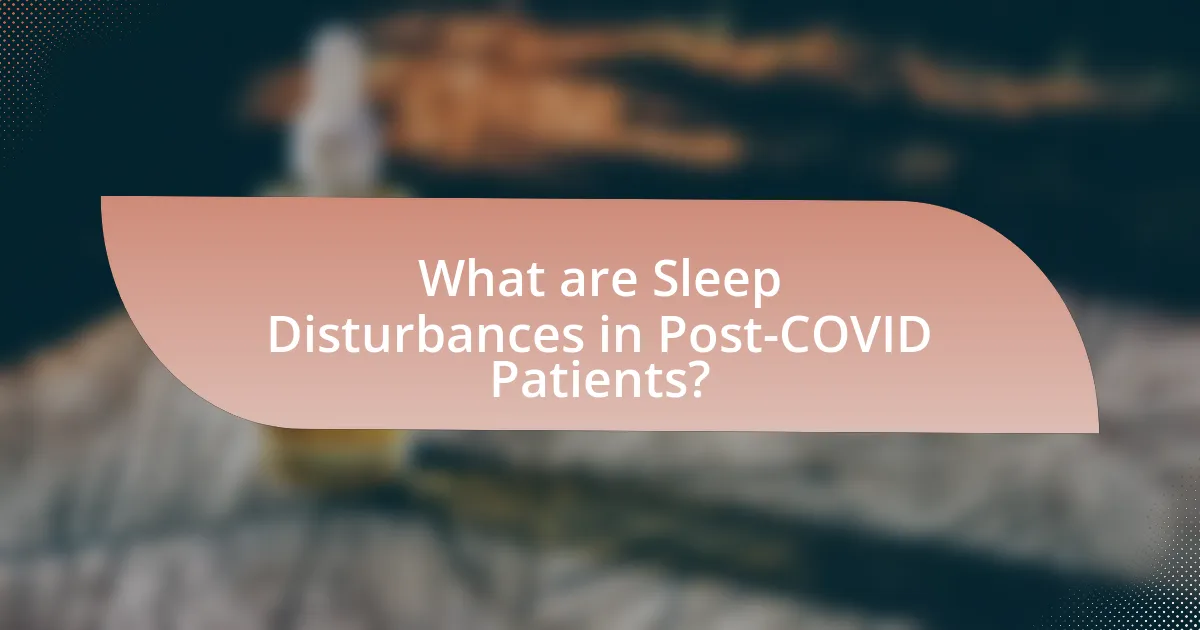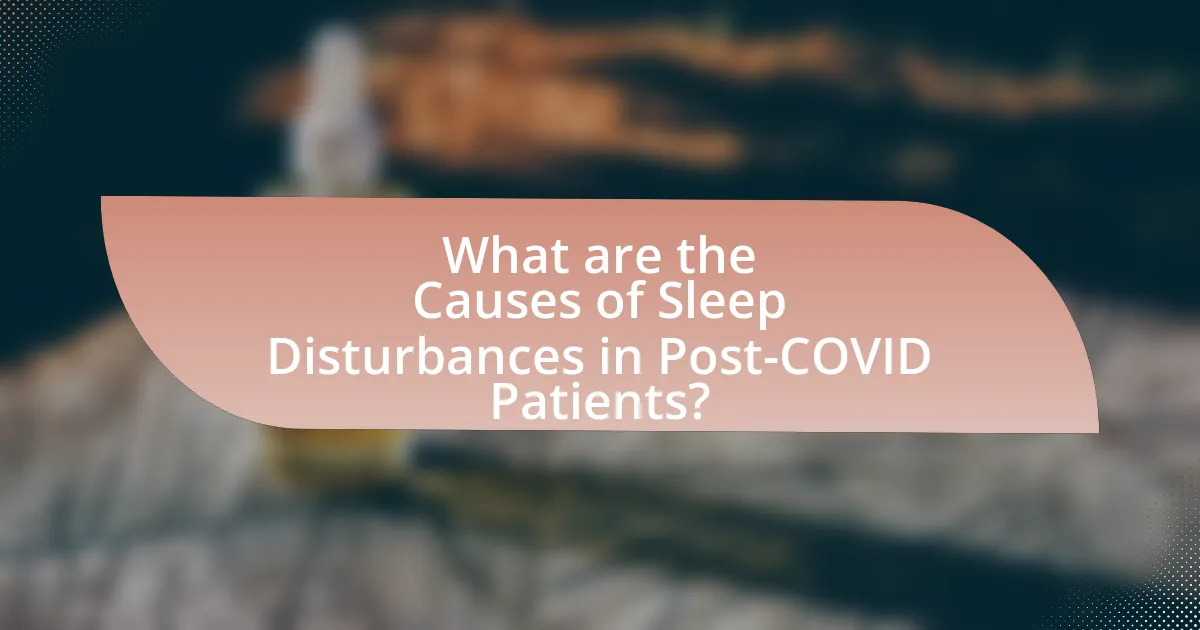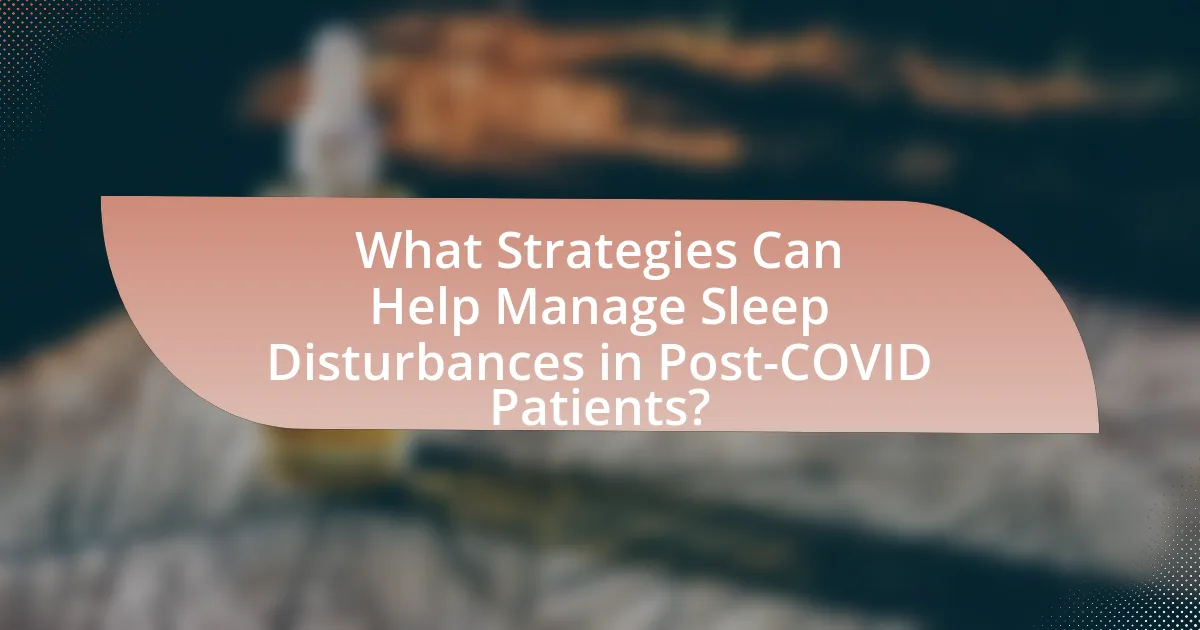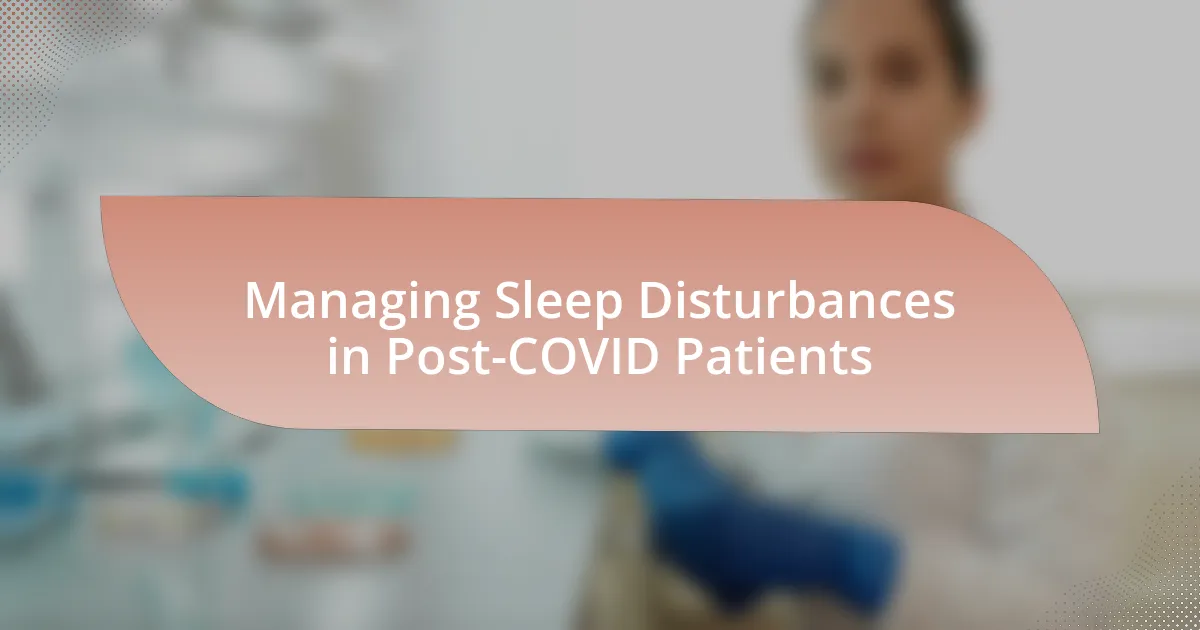Sleep disturbances in post-COVID patients encompass a variety of issues such as insomnia, excessive daytime sleepiness, and altered sleep patterns, affecting approximately 30% to 50% of individuals recovering from COVID-19. These disturbances are often linked to psychological factors like anxiety and depression, as well as physical health complications resulting from the virus. The article explores how these sleep issues manifest, their impact on overall health and recovery, and the multifaceted causes behind them, including physiological changes and medication side effects. Additionally, it discusses effective management strategies, including cognitive behavioral therapy for insomnia (CBT-I), lifestyle modifications, and the importance of sleep hygiene practices in improving sleep quality for this population.

What are Sleep Disturbances in Post-COVID Patients?
Sleep disturbances in post-COVID patients refer to a range of sleep-related issues that individuals experience after recovering from COVID-19. These disturbances can include insomnia, excessive daytime sleepiness, and altered sleep patterns, which have been reported in various studies. Research indicates that approximately 30% to 50% of post-COVID patients experience sleep disturbances, highlighting the prevalence of this issue. Factors contributing to these disturbances may include anxiety, depression, and physical health complications resulting from the virus.
How do sleep disturbances manifest in individuals recovering from COVID-19?
Sleep disturbances in individuals recovering from COVID-19 often manifest as insomnia, fragmented sleep, and increased anxiety or nightmares. Research indicates that approximately 30% to 40% of post-COVID patients report sleep-related issues, which can be attributed to factors such as psychological stress, physical discomfort, and changes in circadian rhythms. A study published in the Journal of Clinical Sleep Medicine found that these disturbances can significantly impact overall recovery and quality of life, highlighting the need for targeted interventions to address sleep health in this population.
What are the common symptoms of sleep disturbances in post-COVID patients?
Common symptoms of sleep disturbances in post-COVID patients include insomnia, excessive daytime sleepiness, and altered sleep patterns. Research indicates that a significant percentage of post-COVID patients report difficulties in falling asleep or staying asleep, with studies showing that approximately 30% to 50% experience insomnia. Additionally, many individuals report increased fatigue and disrupted circadian rhythms, which can further exacerbate sleep issues. These symptoms are often linked to the psychological and physiological effects of COVID-19, including anxiety and changes in overall health status.
How do these symptoms differ from typical sleep disorders?
Symptoms in post-COVID patients differ from typical sleep disorders primarily in their multifaceted nature, often including cognitive dysfunction, fatigue, and mood disturbances alongside sleep issues. Unlike conventional sleep disorders, which typically focus on insomnia or sleep apnea, post-COVID sleep disturbances are part of a broader syndrome that encompasses physical and psychological symptoms, as evidenced by studies indicating that up to 80% of post-COVID patients report sleep-related problems, often linked to ongoing inflammation and neurological changes. This complexity necessitates a more integrated approach to management, addressing not just sleep but overall health and recovery.
Why are sleep disturbances significant in post-COVID recovery?
Sleep disturbances are significant in post-COVID recovery because they can exacerbate physical and mental health issues, hindering overall recovery. Research indicates that individuals recovering from COVID-19 often experience insomnia, anxiety, and depression, which can be linked to disrupted sleep patterns. A study published in the Journal of Clinical Sleep Medicine found that approximately 40% of post-COVID patients reported sleep disturbances, which can lead to decreased cognitive function, impaired immune response, and prolonged recovery times. Addressing these sleep issues is crucial for improving quality of life and facilitating a more effective recovery process.
What impact do sleep disturbances have on overall health and recovery?
Sleep disturbances significantly impair overall health and recovery by disrupting physiological and psychological processes essential for healing. Research indicates that inadequate sleep can lead to increased inflammation, weakened immune response, and impaired cognitive function, all of which are critical for recovery, especially in post-COVID patients. A study published in the journal “Sleep” found that individuals with sleep disturbances experienced a 50% slower recovery rate from illnesses compared to those with regular sleep patterns. Furthermore, chronic sleep deprivation is linked to higher risks of developing conditions such as cardiovascular disease and diabetes, which can further complicate recovery efforts.
How can sleep disturbances affect mental health in post-COVID patients?
Sleep disturbances can significantly worsen mental health in post-COVID patients by increasing the risk of anxiety, depression, and cognitive impairments. Research indicates that individuals recovering from COVID-19 often experience insomnia, nightmares, and other sleep-related issues, which can exacerbate pre-existing mental health conditions or lead to new ones. A study published in the Journal of Affective Disorders found that 40% of post-COVID patients reported symptoms of anxiety and depression, correlating with their sleep quality. Thus, addressing sleep disturbances is crucial for improving overall mental health outcomes in this population.

What are the Causes of Sleep Disturbances in Post-COVID Patients?
Sleep disturbances in post-COVID patients are primarily caused by psychological factors, physical health issues, and changes in circadian rhythms. Psychological factors include anxiety and depression, which have been reported in a significant percentage of post-COVID patients, contributing to insomnia and disrupted sleep patterns. Physical health issues, such as lingering respiratory problems and fatigue, can also interfere with sleep quality. Additionally, changes in circadian rhythms due to altered daily routines during illness can lead to difficulties in maintaining a regular sleep schedule. Studies indicate that approximately 30% of post-COVID patients experience sleep disturbances, highlighting the prevalence and multifactorial nature of this issue.
How does COVID-19 affect the sleep-wake cycle?
COVID-19 significantly disrupts the sleep-wake cycle by causing alterations in sleep patterns, increased insomnia, and changes in circadian rhythms. Research indicates that individuals infected with COVID-19 report higher rates of sleep disturbances, including difficulty falling asleep and maintaining sleep, which can be attributed to factors such as anxiety, stress, and physical illness associated with the virus. A study published in the Journal of Clinical Sleep Medicine found that 36% of COVID-19 patients experienced sleep disturbances, highlighting the widespread impact of the virus on sleep quality. Additionally, the pandemic’s social isolation and lifestyle changes further exacerbate these sleep issues, leading to a more pronounced effect on the sleep-wake cycle in affected individuals.
What physiological changes occur in the body that influence sleep?
Physiological changes that influence sleep include alterations in hormone levels, body temperature regulation, and the functioning of the circadian rhythm. The secretion of melatonin, a hormone that promotes sleep, increases in response to darkness and decreases with light exposure, thus regulating sleep-wake cycles. Additionally, body temperature typically drops during sleep, which is essential for initiating and maintaining sleep. The circadian rhythm, governed by the suprachiasmatic nucleus in the brain, synchronizes these hormonal and temperature changes with the day-night cycle, influencing overall sleep quality. Research indicates that disruptions in these physiological processes can lead to sleep disturbances, particularly in post-COVID patients, where altered circadian rhythms and hormonal imbalances have been observed.
How do psychological factors contribute to sleep disturbances post-COVID?
Psychological factors significantly contribute to sleep disturbances post-COVID by increasing anxiety, depression, and stress levels among individuals recovering from the virus. Research indicates that the prevalence of anxiety and depressive disorders has risen sharply during and after the pandemic, with studies showing that approximately 30% of COVID-19 survivors experience these psychological issues. These mental health conditions disrupt sleep patterns by causing hyperarousal, intrusive thoughts, and emotional distress, which can lead to insomnia and other sleep-related problems. Furthermore, the uncertainty surrounding health outcomes and the impact of social isolation exacerbate these psychological factors, further intensifying sleep disturbances in post-COVID patients.
What role do medications play in sleep disturbances for post-COVID patients?
Medications play a significant role in addressing sleep disturbances for post-COVID patients by targeting specific symptoms such as insomnia and anxiety. Research indicates that many post-COVID patients experience prolonged sleep issues, which can be exacerbated by psychological factors like stress and anxiety related to their illness. For instance, a study published in the Journal of Clinical Sleep Medicine found that pharmacological interventions, including melatonin and certain antidepressants, can improve sleep quality in individuals suffering from sleep disturbances after COVID-19. These medications help regulate sleep patterns and alleviate anxiety, thereby enhancing overall sleep quality and daytime functioning for these patients.
Which medications are commonly prescribed that may affect sleep?
Commonly prescribed medications that may affect sleep include antidepressants, benzodiazepines, corticosteroids, and certain antihistamines. Antidepressants, such as selective serotonin reuptake inhibitors (SSRIs), can lead to insomnia as a side effect. Benzodiazepines, often used for anxiety, can disrupt sleep architecture despite initially promoting sleep. Corticosteroids, prescribed for inflammation, may cause insomnia or altered sleep patterns. Antihistamines, particularly first-generation types like diphenhydramine, can induce drowsiness but may also lead to fragmented sleep. These medications are frequently encountered in clinical settings, highlighting their potential impact on sleep quality in patients, including those recovering from COVID-19.
How can medication side effects lead to sleep issues?
Medication side effects can lead to sleep issues by causing alterations in neurotransmitter levels, which directly affect sleep regulation. For instance, certain medications, such as antidepressants and stimulants, can increase levels of norepinephrine and serotonin, potentially leading to insomnia or disrupted sleep patterns. Additionally, medications that cause side effects like anxiety, restlessness, or increased heart rate can further exacerbate sleep disturbances. Research indicates that approximately 30% of patients taking certain medications report sleep-related side effects, highlighting the significant impact of pharmacological treatments on sleep quality.

What Strategies Can Help Manage Sleep Disturbances in Post-COVID Patients?
Cognitive Behavioral Therapy for Insomnia (CBT-I) is an effective strategy for managing sleep disturbances in post-COVID patients. CBT-I addresses the thoughts and behaviors that contribute to insomnia, helping patients develop healthier sleep patterns. Research indicates that CBT-I can significantly improve sleep quality and reduce insomnia symptoms, with studies showing that approximately 70% of participants experience improved sleep after undergoing this therapy. Additionally, establishing a consistent sleep schedule, practicing relaxation techniques, and creating a conducive sleep environment can further enhance sleep quality for these patients.
What lifestyle changes can improve sleep quality for post-COVID patients?
Post-COVID patients can improve sleep quality by establishing a consistent sleep schedule, engaging in regular physical activity, and practicing relaxation techniques. A consistent sleep schedule helps regulate the body’s internal clock, making it easier to fall asleep and wake up. Regular physical activity, such as walking or yoga, has been shown to enhance sleep quality by reducing anxiety and promoting deeper sleep. Additionally, relaxation techniques like deep breathing, meditation, or progressive muscle relaxation can alleviate stress and prepare the body for restful sleep. Studies indicate that these lifestyle changes can significantly enhance sleep quality and overall well-being in individuals recovering from COVID-19.
How does establishing a sleep routine benefit recovery?
Establishing a sleep routine significantly benefits recovery by promoting consistent sleep patterns that enhance physical and mental health. A regular sleep schedule helps regulate the body’s circadian rhythm, which is crucial for optimal recovery processes, including tissue repair and immune function. Research indicates that individuals with structured sleep routines experience improved sleep quality, leading to better cognitive function and emotional regulation. For instance, a study published in the journal “Sleep” found that consistent sleep patterns are associated with lower levels of inflammation and faster recovery times in patients. This evidence underscores the importance of a sleep routine in facilitating recovery, particularly for post-COVID patients who may experience prolonged fatigue and sleep disturbances.
What role does diet and exercise play in managing sleep disturbances?
Diet and exercise significantly influence the management of sleep disturbances. A balanced diet rich in nutrients, such as magnesium and omega-3 fatty acids, can promote better sleep quality by regulating neurotransmitters involved in sleep cycles. For instance, a study published in the Journal of Clinical Sleep Medicine found that individuals consuming a diet high in fruits, vegetables, and whole grains reported fewer sleep disturbances compared to those with a diet high in processed foods.
Exercise also plays a crucial role; regular physical activity has been shown to improve sleep duration and quality. Research from the National Sleep Foundation indicates that engaging in moderate aerobic exercise can lead to deeper sleep and reduced insomnia symptoms. Specifically, a study found that participants who exercised regularly experienced a 65% improvement in sleep quality.
Together, a nutritious diet and consistent exercise regimen can effectively mitigate sleep disturbances, particularly in post-COVID patients who may experience heightened sleep issues.
What therapeutic interventions are available for sleep disturbances?
Cognitive Behavioral Therapy for Insomnia (CBT-I) is a primary therapeutic intervention for sleep disturbances. CBT-I focuses on changing sleep habits and misconceptions about sleep, which has been shown to improve sleep quality and reduce insomnia symptoms in various populations, including post-COVID patients. Additionally, pharmacological treatments such as melatonin and certain antidepressants can be effective in managing sleep disturbances, as evidenced by studies indicating their efficacy in improving sleep onset and duration. Furthermore, lifestyle modifications, including sleep hygiene education and relaxation techniques, are also recommended to enhance sleep quality.
How can cognitive behavioral therapy improve sleep in post-COVID patients?
Cognitive behavioral therapy (CBT) can improve sleep in post-COVID patients by addressing the cognitive and behavioral factors that contribute to insomnia and sleep disturbances. CBT helps patients identify and modify negative thought patterns and behaviors related to sleep, which can be exacerbated by the stress and anxiety associated with post-COVID conditions. Research indicates that CBT has been effective in treating insomnia, with studies showing that it can lead to significant improvements in sleep quality and duration. For instance, a meta-analysis published in the journal “Sleep” found that CBT for insomnia resulted in moderate to large effects on sleep outcomes, demonstrating its efficacy in managing sleep issues in various populations, including those recovering from COVID-19.
What are the benefits of sleep hygiene practices?
Sleep hygiene practices significantly improve sleep quality and overall health. These practices, which include maintaining a consistent sleep schedule, creating a comfortable sleep environment, and limiting screen time before bed, help regulate the body’s internal clock and promote restorative sleep. Research indicates that good sleep hygiene can reduce insomnia symptoms and enhance daytime alertness, leading to better cognitive function and emotional well-being. A study published in the Journal of Clinical Sleep Medicine found that individuals who adhered to sleep hygiene recommendations experienced a 30% improvement in sleep quality compared to those who did not.
What are some practical tips for managing sleep disturbances in post-COVID patients?
Practical tips for managing sleep disturbances in post-COVID patients include establishing a consistent sleep schedule, creating a calming bedtime routine, and optimizing the sleep environment. A consistent sleep schedule helps regulate the body’s internal clock, while a calming routine can reduce anxiety and promote relaxation before sleep. Optimizing the sleep environment involves ensuring a dark, quiet, and cool room, which has been shown to enhance sleep quality. Additionally, cognitive behavioral therapy for insomnia (CBT-I) has been effective in treating sleep disturbances, as supported by research published in the Journal of Clinical Sleep Medicine, which indicates that CBT-I can significantly improve sleep outcomes in patients with insomnia.
How can mindfulness and relaxation techniques aid in better sleep?
Mindfulness and relaxation techniques can significantly improve sleep quality by reducing stress and anxiety, which are common barriers to restful sleep. These techniques, such as meditation, deep breathing, and progressive muscle relaxation, activate the body’s relaxation response, lowering heart rate and cortisol levels, thereby promoting a state conducive to sleep. Research indicates that mindfulness practices can enhance sleep quality and reduce insomnia symptoms; for instance, a study published in JAMA Internal Medicine found that mindfulness meditation improved sleep quality in older adults with sleep disturbances. By incorporating these techniques into a nightly routine, individuals can create a more peaceful mental environment, facilitating easier transition into sleep.
What resources are available for patients struggling with sleep issues?
Patients struggling with sleep issues can access various resources, including cognitive behavioral therapy for insomnia (CBT-I), sleep hygiene education, and support groups. CBT-I is a structured program that helps individuals identify and replace thoughts and behaviors that cause or worsen sleep problems, and studies show it is effective for improving sleep quality. Sleep hygiene education provides practical tips for creating a conducive sleep environment and establishing a regular sleep schedule, which can significantly enhance sleep quality. Additionally, support groups offer a platform for patients to share experiences and coping strategies, fostering a sense of community and understanding among those facing similar challenges.


